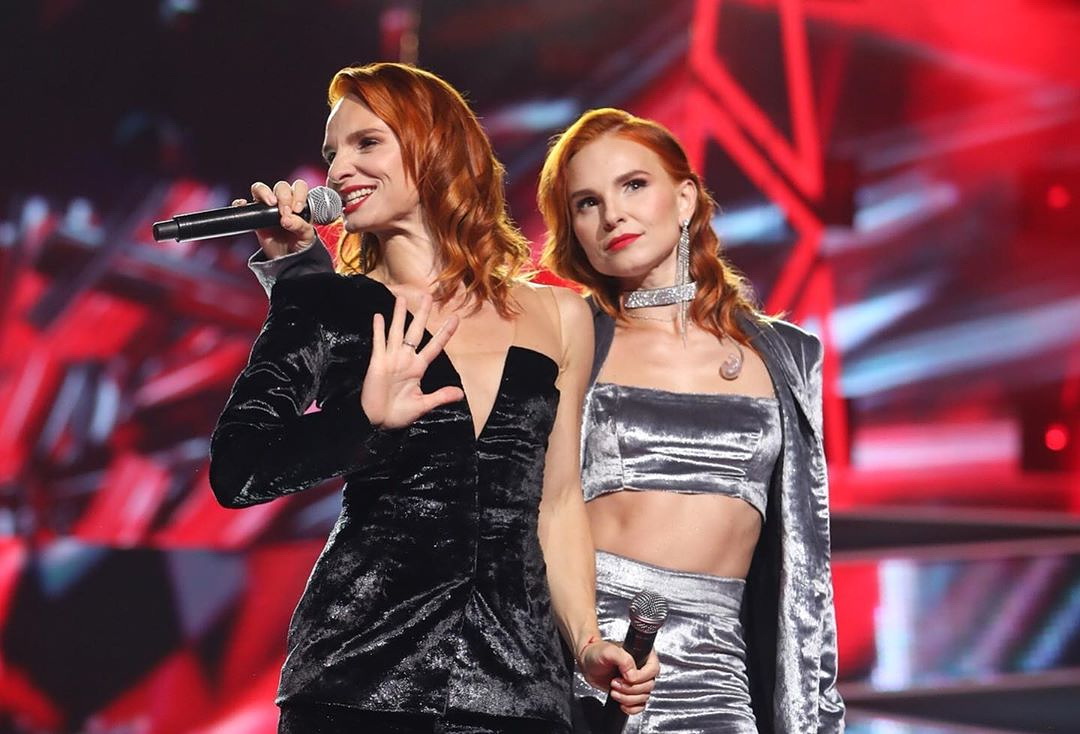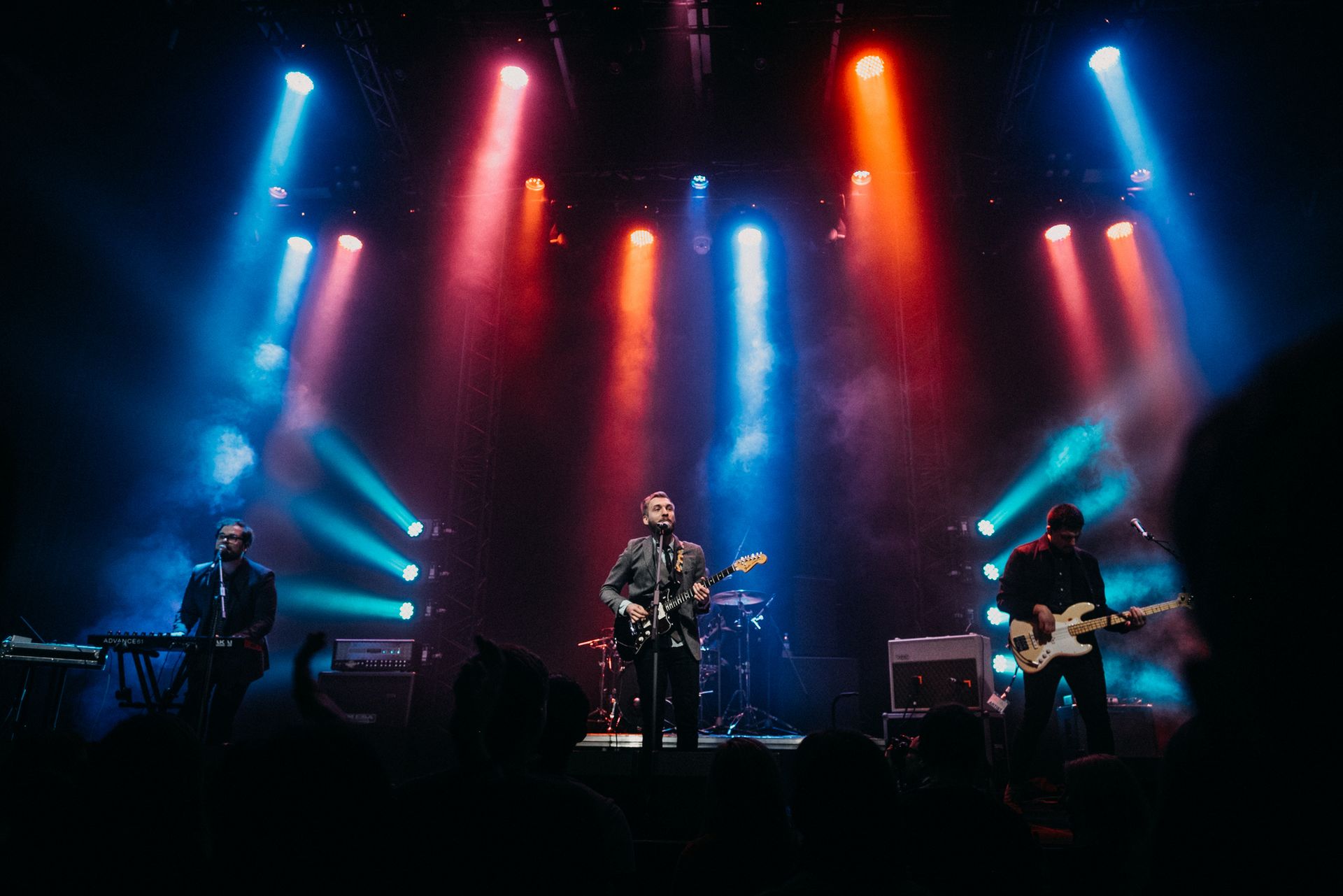While Ukraine celebrated its Independence Day on Aug. 24, Ukrainian artist Taras and sister duo Anna-Maria entered the New Wave contest for young musicians in Sochi, Russia. They follow in footsteps of many Ukrainian artists who have performed in Russia even after the Kremlin launched its ongoing war against their homeland in 2014, killing 13,000 people and dismembering 7 percent of the nation.
“We want to show our music to the people of planet earth. To honorably represent our country,” Anna and Maria Opanasiuk wrote about their participation in the Russian contest on Instagram. This follows the rhetoric of other Ukrainians touring in Russia, who usually say they “try to reach their fans” or “spread peace with their music.”
But in strictly economic terms, this gravity toward the larger Russian music market can be explained by two factors. First of all, the Ukrainian market is too small for the ambitions of many Ukrainian musicians. Secondly, the U.S. and Western European markets remain poorly accessible to them. So they choose the Russian one.
Russian show business is also more attractive to Ukrainian artists who prefer to sing in Russian. The quotas for Ukrainian-language songs on the radio tipped the scales in favor of Ukrainian-language music, decreasing the demand radio stations have for songs in Russian.
This also means that, to be heard on Ukrainian radio, musicians have to produce more songs in Ukrainian. But a Ukrainian-language repertoire can be less relevant for audiences in Western countries. So artists may have to create songs both in Ukrainian and foreign languages to be noticed in both domestic and international markets.
Besides quotas and the temptations of the Russian market, Ukrainian musicians face other problems: piracy remains rampant, destroying the music sales of artists, music labels, distribution and streaming platforms.
Because of this, the franchises of major music labels in Ukraine rarely sign contracts with Ukrainian artists. And although two of the world’s Big Three music labels have Ukrainian affiliates, they still work with Ukrainian artists through their Russian offices.
Fighting piracy and attracting foreign investments should be the top priorities for the development of the Ukrainian music industry, says Oleksandr Varenitsa, the founder of Mnogo Vody PR agency, which works with about 40 Ukrainian acts.
“The music industry should be developed first — an artist should stand firm on his feet. Only then it’s worth dealing with ideological issues,” Varenitsa told the Kyiv Post.

Ukrainian sister duo Anna-Maria performs at the New Wave contest for young musicians in Sochi, Russia on Aug. 27, 2019. (Instagram/New Wave)
Russian touring
The issue of Ukrainian artists performing in Russia has been a subject of heated debate in Ukrainian society since the start of Russia’s war against Ukraine in 2014.
In the most visible case this year, the singer Maruv, who won the Ukrainian national selection competition for the Eurovision Song Contest, was criticized by a section of the public for her frequent performances in Russia.
In response, the Ukrainian Public Broadcasting Company, Eurovision’s partner in Ukraine, added a clause to the contract, banning Ukraine’s representative from performing in Russia before Eurovision, or for three months after.
This prompted a counter-outcry from another section of the public outraged by the sudden change in the rules and perceived interference in Maruv’s freedom to perform. In the end, Maruv and other finalists refused to sign the contract, and Ukraine was forced to withdraw from the competition entirely.
For many Ukrainians, there is an apparent ethical issue in giving performances in Russia. Beyond killing over 13,000 people, Moscow’s war has also injured as many as 30,000 and displaced at least 1.5 million. It has directly affected huge numbers of Ukrainians.
There is also a more material reason to oppose touring in Russia: as non-resident foreigners, Ukrainian artists have to pay a 30-percent income tax on every legal payment they get for their concerts in Russia. That means $300 of every $1,000 they make goes to the Russian state budget, helping to finance the war against Ukraine.
But many Ukrainian artists are signed with Russian music labels or Russian affiliates of major international labels. This means that tours in Russia can be required by their contracts with the labels. Maruv, for example, was signed on by Warner Music Russia after she tried many talent shows in Ukraine but wasn’t taken on by any Ukrainian labels.
Touring in Russia is currently not regulated by any laws. After the Eurovision scandal, former Vice Prime Minister Vyacheslav Kyrylenko suggested a bill that would require artists to inform the public about their tours in Russia. A state agency would keep a register of such musicians and mark their shows’ posters, music videos and songs played on the radio with a message: “This artist tours on the territory of the aggressor state.”
Varenitsa suggests another tactic: to introduce a 20–25 percent “conscience tax” on the money made by Ukrainian artists through their concerts in Russia. The tax revenue could be used to help promote other Ukrainian artists in Europe.
“With this model, all parties will be satisfied,” Varenitsa says.

Ukrainian indie rock band 5 Vymir performs in Kyiv on Nov. 26, 2017.
Language quotas
Another contentious issue in Ukrainian music has been the language quotas for Ukrainian-language songs on the radio.
The state established the quotas at 25 percent in 2016, providing for them to increase by 5 percent every year until 2018. So, today, 35 percent of all songs that play on the radio should be in Ukrainian, or roughly every third song. Stations that don’t fulfill the quotas face considerable fines.
The authors of the amendments that established the quotas hoped that they would not only help popularize the Ukrainian language, but also stimulate new Ukrainian artists. Similar quotas have operated in European Union countries like France and Poland.
“Thanks to the language quotas, the demand for Ukrainian-language cultural products appeared. And this has given impetus to the development of recording studios, the emergence of new artists, composers, authors,” Viktoriia Siumar, one of the initiators of the amendments, told Radio Free Europe / Radio Liberty.
A new wave of Ukrainian music has indeed appeared — but not due to the quotas. Critically-acclaimed young artists like Onuka, Yuko, Alyona Alyona and Alina Pash, who mostly sing in Ukrainian, rarely make it to the radio.
Kostyantyn Pochtar, the frontman of the young indie rock band 5 Vymir, says that demand for Ukrainian-language music increased naturally after the EuroMaidan revolution, a popular uprising that drove Kremlin-backed President Viktor Yanukovych from power on Feb. 22, 2014.
“Quotas did not help us. We have some rotations on the radio, but not very often. Radio has an effect when your songs get played every hour,” Pochtar told the Kyiv Post.
Instead, radio stations tend to play time-tested Ukrainian-language hits or songs by mainstream pop artists. Rarely does music by new Ukrainian musicians make it to the top of the radio charts, where some of the same songs stay every year. According to the TopHit music portal’s data, 88 of the top 200 songs played on the radio in 2017 made it to the same list in 2018.
Varenitsa says that, instead of promoting new content and young artists, language quotas on the radio only accelerate the outflow of the audience from the radio. Young listeners go to find new music on the internet, YouTube in particular. Most of that music is from Russia, according to YouTube charts.
During his election campaign, President Volodymyr Zelensky said he would not abolish Ukrainian language quotas on TV and radio, but would seek other ways to enforce them. One way to do this would be by reducing taxes for media companies that create Ukrainian-language content, he said.
Volodymyr Borodiansky, the new Minister of Humanitarian Policy appointed by Zelensky and a former TV executive, has said that he was against the language quotas but then changed his mind.
“Now I think that this was the right step, and it brought results. I always believed that prohibitions are inefficient and outdated. But in this case it worked perfectly,” Borodiansky told the LB.ua news website.
Varenitsa says that quotas should work in favor of Ukrainian artists, not the language that they sing in. He suggests minimizing or eliminating the airtime of Russian music on Ukrainian radio and then establishing quotas for songs made by Ukrainian artists in any languages, including Russian and English.
“We should promote Ukrainian music, but not limit it by language, because the language is simply an artistic tool for musicians,” Varenitsa says. “If we promote Ukrainian artists that sing in English in our own market, they will get more chances to surprise Western markets with their music.”
